Israel embarks on bloody Gaza endgame with war against Hamas in Palestine
Defence Minister Yoav Gallant says Israel is determined to ‘eliminate Hamas from the face of the earth’ as a new world order takes shape before our eyes.
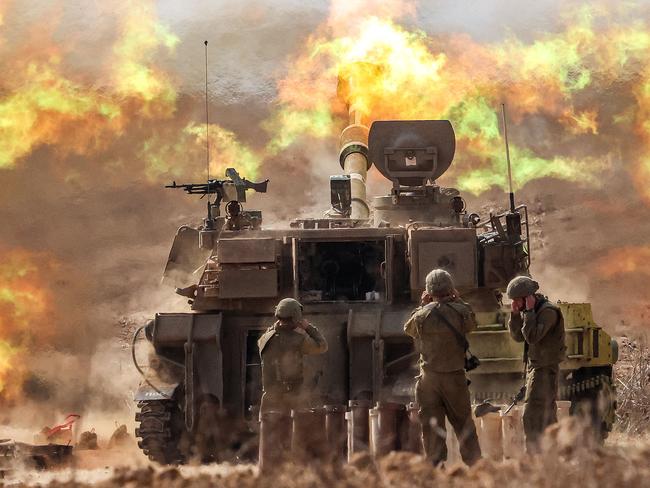
As US President Joe Biden left Israel, following German Chancellor Olaf Scholz, British Prime Minister Rishi Sunak arrived. Like the Americans, the British have moved naval resources into the area in support of Israel. The parade of international statesmen visiting Israel – Peter Dutton helpfully suggested Anthony Albanese should join their number – is a powerful show of international democratic support for the Jewish state.
No visitor was more important or welcome than Biden, the leader of the most powerful nation, with the biggest and most powerful military in the world. Biden followed up his visit to Israel with a powerful speech to the nation, possibly the best of his career, which placed support for Israel front and centre, and reasserted America’s global security leadership role.
Biden is planning to give aid, weapons and ammunition to Israel. Most important, he offered full American verification of Israel’s claim that it did not strike a hospital in Gaza, which Hamas authorities say resulted in 500 dead. Hamas is exaggerating the death toll, seasoned observers suggest, but the partial destruction of the hospital is a terrible human tragedy. It also shows how fragile much of the international support for Israel is.
Even in a Western democratic country such as Canada, Prime Minister Justin Trudeau rushed to instantly condemn Israel before even the slightest wait to clarify the situation and get the facts. Trudeau is not known for strategic sagacity, but his instant judgment against Israel is representative.

The Israelis say the hospital was struck by a failed rocket launched nearby by Palestinian Islamic Jihad. A substantial portion of Hamas and PIJ rockets fail to travel their scheduled distance and fall inside Gaza itself. The Israelis provided substantial evidence,
They produced photos of PIJ rockets being launched from just near the hospital, plus photography of a rocket failing just over the hospital. There was photo evidence of the damage to the hospital that was completely inconsistent with it being struck by an Israeli munition. And there was recorded conversation of Hamas leaders within Gaza acknowledging that it was a friendly-fire incident.
Critically, the Americans, who through satellite and other technology have the whole of Gaza under intense surveillance, independently verified the Israeli claim. However, Muslim opinion throughout the world assumed Israel was guilty. Even the Saudi government, which a few weeks ago was receiving Israeli ministerial visitors and approaching historic normalistaion of relations with Jerusalem, described the hospital tragedy as a heinous crime carried out by Israel. Damagingly, the bombing led to the cancellation of a proposed Amman summit between Biden, Jordan’s King Abdullah, Egypt’s President Abdel-Fattah el-Sisi and Palestinian Authority president Mahmoud Abbas.
Biden is slow and fragile in press conferences, but his performance, and that of the American foreign and military policy machine, in this crisis has been impressive. He condemns Hamas and its monstrous torture, murder and kidnap of Israeli civilians; he supports Israel’s right to self-defence; he wants to deter Israel’s other enemies, especially Iran; but he wants Israel to exercise restraint and discrimination in its operations in Gaza; he wants humanitarian aid to get to the people of Gaza; and he is trying to maintain US influence in the Arab world. That’s an enormous mission but, frankly, it’s what superpowers do.
The immense hostility to Israel in the Arab and Muslim worlds will grow as the operation unfolds. So will hostility in the West, where the political left, especially the far left, effectively has allied itself to the blatant Jew-hatred of so many Muslim demonstrators. This is one of the sickest alliances in modern culture and demonstrates the ubiquity of anti-Semitism, now fuelled on the far left and in the Arab world to complement the traditional anti-Semitism of the far Right.
On the left, anti-Semitism is not only found at the extremes. It’s evident on campuses. Western universities have come to regard the West itself as evil and Israel as the most evil manifestation of the West.
Thus Harvard University, in its preening moral vanity, routinely takes political positions on all manner of issues: race relations, US police behaviour, international issues. But after the singular barbaric Hamas attacks on Jewish civilians it initially had nothing to say at all. American Ivy League universities a century ago kept Jews out because their work ethic meant they were over-represented if admission was on merit.
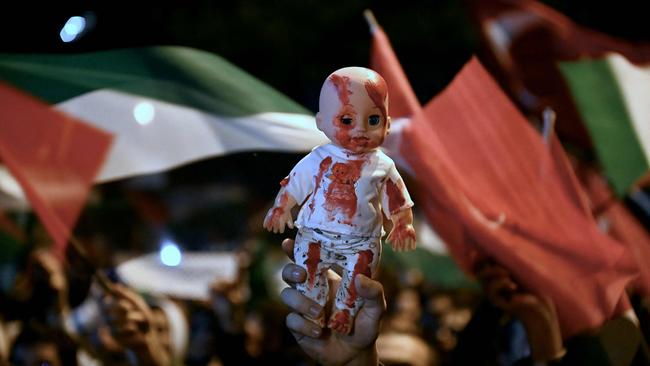
Now, Harvard all but regards Israel as toxic. Then more than 30 Harvard undergraduate bodies blamed the Hamas violence not on Hamas but entirely on Israel, in a perfect expression of deranged intersectional critical theory and postmodern race politics. It was contemptible. Finally, Harvard fluttered a feather of the dimmest dissent to its own undergraduate purveyors of anti-Semitic tropes.
Western demonstrators were proclaiming “I stand with Gaza” almost as soon as the grotesque Hamas atrocities were reported. The Albanese government is certainly an honourable exception to all this. But cabinet minister Ed Husic has accused his own government of not valuing Palestinian life as much as it values Israeli life, as though the Hamas atrocities, directed intentionally to degrade and kill civilians, were the moral equivalent of Israel’s right and responsibility to protect its population, even as it certainly has moral obligations in how it goes about that defence.
The Sydney demonstrators’ chants of “F..k the Jews” and “Gas the Jews” were representative of demonstrations in many Western cities. The relentless anti-Israel propaganda has already moved into hyper-drive. While the Americans have testified conclusively that the hospital strike in Gaza wasn’t carried out by Israel, this already lives on global social media as an Israeli atrocity.
All of this is likely to get much worse as Israel conducts a ground operation in Gaza. The Israeli incursion was probably delayed by Biden’s visit, and may have been delayed because of Sunak’s presence. These visits by major heads of government, and their expressions of support for Israel, are too important for Benjamin Netanyahu’s government to turn down.
But Israel must move into Gaza soon. It has mobilised 360,000 reservists and evacuated both its most northern towns, near the border with Lebanon, and the towns and kibbutzes near the Gaza Strip in the south. Israeli Defence Minister Yoav Gallant says Israel is determined to “eliminate Hamas from the face of the earth”. Netanyahu has been equally blunt.
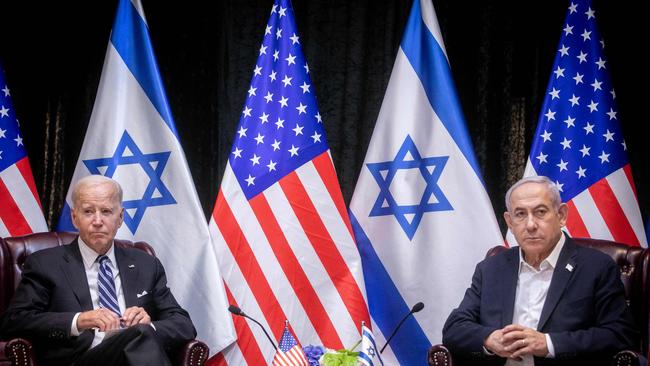
These are understandably big words. What will they mean on the ground? What exactly will the Israelis do when they go in to Gaza, and what do they envisage for Gaza when their operation is finished? Israel certainly wants to destroy the Hamas leadership structure. That means capturing or killing all the Hamas leaders it can identify. It wants to destroy Hamas weapons and ammunition stocks.
It certainly wants to root out the tunnel network, which is many kilometres long and many metres deep, and allows Hamas leaders to hide, weapons to be stored, surprise attacks to be sprung, hostages to be kept away from rescue.
The 199 hostages Hamas holds are also a high priority for Israel. It will want to rescue as many as it can. There are Americans and other foreigners among the hostages. Hamas has said it will release “foreign guests” in due course. It has also threatened to start executing Israeli hostagesand posting videos of these executions to the net. In the past, Israel has been willing to pay an enormous price to free its hostage citizens. But that policy, a reflex of solidarity, is possible only when Israel is at its strongest and can afford such a price. Now, Hamas holding the hostages will not form a veto on Israeli action.
At the same time, Israel will want to demonstrate to the world, and to itself, that it takes seriously the need never intentionally to target civilians. The Israeli government has agreed with the Biden administration and Cairo that limited aid can flow into Gaza across the Egyptian border. Probably this is where dual nationals will also be able eventually to leave. There are 45 Australian citizens in Gaza and the Albanese government is working hard to get them out.
The deadly operational difficulties facing any Israeli action are horrendous. Hamas prepared its murder spree with meticulous attention to detail. It wanted to provoke a big Israeli operation in Gaza to polarise Arab and world opinion against Israel and to inflict desperate casualties on Israeli soldiers.
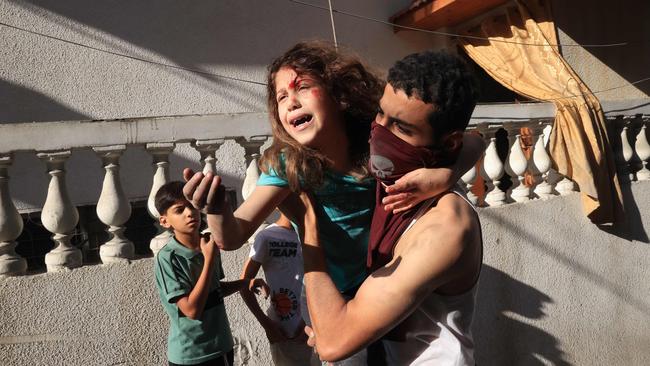
For a long time the Israel Defence Forces had frequent experience of urban operations in Palestinian towns and cities. It got out of Gaza altogether in 2005 to make this a much less frequent and necessary occurrence.
The IDF pioneered all kinds of innovations in urban warfare, such as fighting through a street by zig-zagging across it rather than going down the middle, entering houses by blowing a hole in a wall rather than going through a booby-trapped door. The Israelis pioneered the use of all kinds of sensors in urban warfare, from night vision goggles to electronic jamming devices. Tanks are manifestly irrelevant to Australia because any conflict involving us will be maritime. But they are a central tool in urban warfare. However, the IDF will face booby traps, improvised explosive devices, suicide bombers and much else.
Hamas will certainly learn from Ukrainian success against Russian tanks. They will surely use light, cheap, swarming, deadly drones to strike tanks. Israeli forces will need to be extremely mobile and lethal. They will need to move fast. Hamas fighters will locate themselves among civilians and disguise themselves as civilians. Israeli soldiers will be forced to make split-second decisions on whether they need to fire on someone.
That’s why the Israelis have been telling Gaza civilians to evacuate south of Gaza City. But even these sorts of measures make the IDF’s military task more complicated. If civilians can find shelter in the south of Gaza, so can Hamas commanders. And they can store a lot of military equipment there as well as in their tunnels.
The Israelis have not told anyone exactly what their plans are. And whatever their plans, how far they proceed depends on what cost they are paying and what the international reaction is. The most elemental necessity will be to keep the Biden administration onside.
The danger of a two-front war if Hezbollah joins in from the north is very real. But while Hezbollah has launched some rockets into Israel and tried one or two terrorist incursions, it has so far kept well below the level of attack that would generate broader hostilities. This is partly because every other faction in Lebanon, including many of Hezbollah’s fellow Shi’ites, are saying to Hezbollah: don’t embroil us in an all-out war with Israel. The presence of the two US carrier battle groups and the British naval assets is designed primarily to deter Iran from directly attacking Israel. But Hezbollah must also ponder the possibility that the US itself would fire on Hezbollah positions if it launched a general offensive against Israel.
Veteran Israeli strategic analyst Ehud Ya’ari, one of the most sagacious students of the broader Middle East, tells Inquirer: “If there is conflict with Hezbollah, whatever might happen in Israel, Lebanon will be devastated.”
I ask Ya’ari what Israel envisages for the day after its ground operation in Gaza ends. He says: “The general idea on which Israel has worked jointly with the Americans is to destroy as much of Hamas in Gaza as possible. But Israel won’t stay in Gaza indefinitely. After that, there is envisaged some joint international effort to get a local government for Gaza under Palestinian leadership. There will be economic aid for Gaza, including from Israel.
“There might be a multi-national (policing) force, involving Egypt with Gulf nations.” During the ground operation itself, says Ya’ari, there will be “a humanitarian corridor south of Gaza City. (US Secretary of State Antony) Blinken got a detailed agreement on this.”
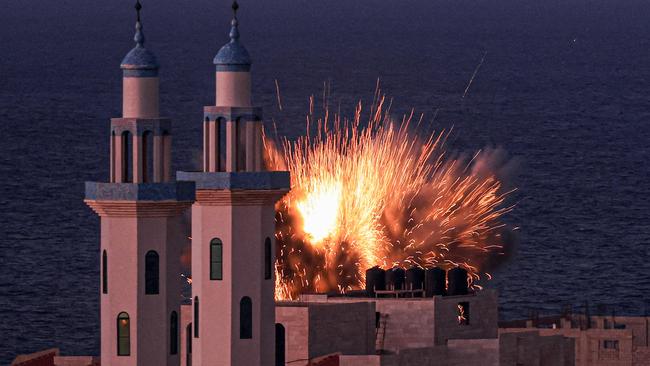
But how credible is the envisaged post-Israeli ground incursion future for Hamas? “If Israel achieves what our leaders are promising, what is left of Hamas won’t be very strong or very well organised.” Eventually the Palestinian Authority might be able to re-establish unified government in Gaza, but it cannot be seen to be doing Israel’s bidding, or following the lead of Israel’s tanks.
One big danger is that however elegant a post-invasion plan for Gaza is, it could easily be derailed by recurrent terrorism. It’s unlikely any foreign policing force would be willing to endure any significant casualties if Hamas, or a successor extremist movement, is able to mount bombings or other atrocities. “Israel will have to act in Gaza in the future like it acts in the West Bank today,” Ya’ari says. “If the local security forces don’t act we will come and make the arrests. Israeli police will break down the doors and arrest the terrorists.”
Israel does not want to rule Gaza indefinitely but it will not again try to wash its hands of the territory completely and just lock it behind a wall. Israeli military policy around Gaza will also change permanently. Ya’ari is fiercely critical of the judgments made by the Director of Military Intelligence. Israel, he says, was “trapped in a concept” that held Hamas had no interest in having another major conflict with Israel. There was only a battalion and a half of the army near the whole of the Gaza border. That was manifestly inadequate. Similarly, more attack helicopters need to be kept at readiness.
The bottom line is ugly but unavoidable. If Israel is to achieve its stated objectives in Gaza there will be a prolonged and bloody ground campaign. Israel will never intentionally target civilians but there will be many innocent victims. Israel is not breaching the doctrine of proportionality here. That is not only because of the brutality of the Hamas slaughter but also because if it is effectively unanswered that guarantees it will happen again. So the response has to be proportionate to the overall credible threat.
Ya’ari believes Iran will be deterred from major direct involvement itself by the presence of the US Navy. Like others, he thinks Iran relishes a conflict in which only its proxies die: “The Iranians don’t mind how many Shi’ite Arabs or Sunni Gazans get killed fighting Israel,” he says.
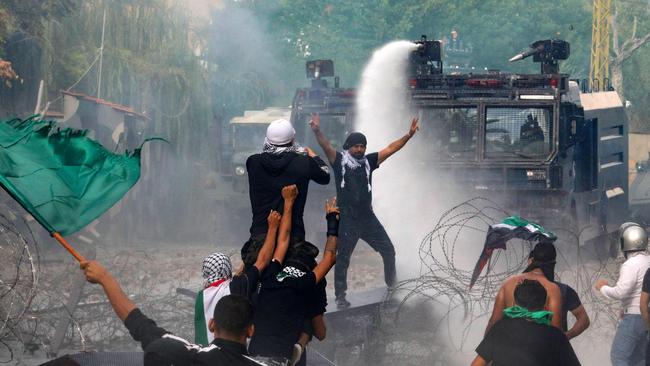
Nonetheless, he observes Iran already making several big regional moves to begin a much wider regional conflict if it should decide to do so: “They are sending Iraqi Shi’ite militias into Syria. These are getting closer to the Golan Heights. It’s not huge numbers but you don’t need huge numbers to lob rockets at Israel. They (Iran) and Hamas are mounting a campaign to get the Palestinian Authority security forces to mutiny and take power from Abbas.”
This is where this conflict has revealed, if not shaped, a new and hostile world order. While Biden was in Israel, Russia’s Vladimir Putin was in Beijing, being warmly received by his closest friend in the international arena, Xi Jinping.
The central strategic fact of our time is the de facto, and increasingly formal, alliance between China, Russia, Iran and North Korea. Iran and North Korea have sold weapons to Russia. All four increasingly trade with each other. China and Russia prevent the UN Security Council taking any action.
The US has borne the lion’s share of the burden of supporting Ukraine. This must surely shift to the Europeans. The US will be focused again on the Middle East, which means fewer resources, both military and diplomatic, for the Indo-Pacific. The US-allied nations surely need to lift defence spending to 3 to 4 per cent of GDP.
Every serious act of government involves a choice. Defence spending means lower social spending. Western nations are not making the choice to provide for their security. Apart from Israel, they still ultimately leave everything up to the Americans. Few countries are more culpable on this score than Australia, which makes a pitiful defence effort. Canberra talks like Goliath but looks like Bambi.
It is not only Israel that can be surprised, shocked, threatened with existential danger, by an intelligence failure in underestimating a military threat. Unlike Australia, Israel has at least provided for itself the resources to prevail. We’re just fast asleep.


A new world order of savagery, violence and polarisation is taking shape before our eyes as Israel works feverishly to determine how it’s going to destroy the Hamas leadership in the Gaza Strip, and what on earth Gaza will look like after the Israeli military mission is complete.